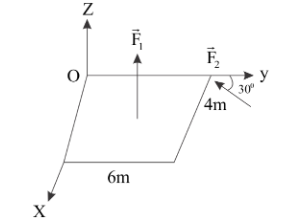Question
Question: A slob is subjected to two forces \({\vec F_1}\) and \({\vec F_2}\) of same magnitude F as shown in ...
A slob is subjected to two forces F1 and F2 of same magnitude F as shown in the figure. Force F2 is in XY-plane while force F1 acts along Z-axis at the point (2i^+3j^). What will be the moment of these forces about point O?

(A) (3i^−2j^−3k^)F
(B) (3i^+2j^+3k^)F
(C) (3i^+2j^−3k^)F
(D) (3i^−2j^+3k^)F
Solution
The moment of a force about a point can be found out by taking the cross product of the position vector of the point at which the force is being applied and the force vector. The total moment of two or more forces about a point is the sum of moments of individual forces about that point.
Complete step by step answer:
From the given figure, we can write the force vectors and the position vectors of the points at which these forces are acting. We obtain,
F1=Fk^ …equation (1)
r1=2i^+3j^ …equation (2)
F2=(Fsin30∘)(−i^)+(Fcos30∘)(−j^)=−2Fi^−23Fj^…equation (3)
r2=6j^ …equation (4)
The position vector is the vector to the point at the application of force with its tail at O.
The cross products of unit vectors are as follows,
i^×j^=k^
⇒j^×i^=−k^
⇒i^×i^=0
⇒j^×k^=i^
⇒k^×j^=−i^
⇒j^×j^=0
⇒k^×i^=j^
⇒i^×k^=−j^
⇒k^×k^=0
We now find the moment of force F1 about point O by taking the cross product of the position vector of the point at which this force is acting and the force itself. Using equation (1) and (2), we obtain,
τ1=r1×F1=(2i^+3j^)×(Fk^)=3Fi^−2Fj^ …equation (5)
We now find the moment of force F2 about point O by taking the cross product of the position vector of the point at which this force is acting and the force itself. Using equation (3) and (4), we obtain,
τ2=r2×F2=(6j^)×(−2Fi^−23Fj^)=3Fk^ …equation (6)
The total moment acting about point O is the sum of the moments of forces F1 and F2 about that point. So, the total moment is,
τ=τ1+τ2=3Fi^−2Fj^+3Fk^=(3i^−2j^+3k^)F
Hence, the correct answer is option D..
Note: The moment of force is the cross product of distance and force. The order in which the distance and force are written in the formula for moment of force is important as interchanging their positions may give a different answer, leading to an incorrect solution.
